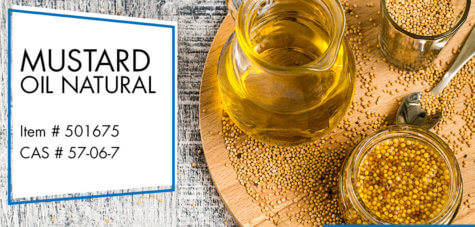Mustard Oil Natural
Item#501675 CAS: 57-06-7 FEMA: 2034
Odor Strength: High
Odor Description: Sharp, pungent, horseradish
Taste Description: Mustard, sharp, horseradish
Mustard is of the Brassica genus; the same family as cauliflower, broccoli, and cabbages. It possesses a pungent aroma and taste, making it a unique ingredient in the flavor and fragrance industry. It is found in trace amounts in fragrance formulations such as Bogue Noun and O Boticário Karité. Mustard oil’s spicy pungency is popularly used in Indian cooking and in some commercial products such as pickles.
There are two general categories of Mustard: Black Mustard and White Mustard. Typically, mustard oil is extracted form Black Mustard seeds, also known as Brassica nigra. The botanical is native to Southeastern Europe, the Eastern Mediterranean, and some part of Asia. Now, it is commonly cultivated in coastal Ethiopia. Some varieties are grown in Southern Russia, India, and Iran. Mustard seeds are ready to harvest during spring months; or after flowers bloom, then wither and fall off.
The process to extract essential oil from mustard seed is slightly complex. To produce mustard essential oil, a special compound called glycoside must be extracted from the seeds. In the presence of an enzyme and warm water, black mustard seeds naturally release the glycoside trapped in their cells. Once this process is complete, the oil is extracted via steam distillation. The mixture is exposed to pressurized steam which releases more valuable compounds, as they evaporate with the steam. The steam flows through a cooling chamber, which condenses it to water. The mustard oil floats to the top of the chamber and is separated from the water. Mustard soil is incredibly rich in Allyl Isothiocyanate, which is a relatively rare organic compound.
Mustard oil smells sharp, strong, and almost acrylic. Due to its peculiar scent, it is rarely used in perfumery. However, some more adventurous perfumers have made pleasantly interesting fragrances using trace amounts of mustard oil paired with accords such as hyacinth, violet, olibanum, and black pepper,
Mustard oil is much more popular in the flavor industry than in fragrance applications. As mentioned before, it is very useful in canned goods such as pickles. It also flavors many sauces, marinades, and seasonings. Of course, mustard seed itself is used to flavor everyone’s favorite sunny yellow condiment: mustard!
Mustard oil is not commonly used in aromatherapy, as it can be highly irritating to the skin.
If you are interested in seeing a sample or placing an order, please email Nicholas Bourne at nbourne@vigon.com or call 570-422-6026.

